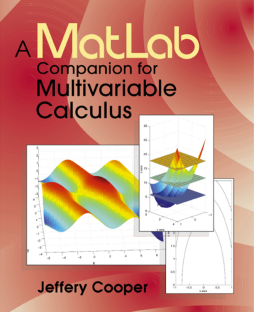
Additional Information
Book Details
Abstract
Offering a concise collection of MatLab programs and exercises to accompany a third semester course in multivariable calculus, A MatLab Companion for Multivariable Calculus introduces simple numerical procedures such as numerical differentiation, numerical integration and Newton's method in several variables, thereby allowing students to tackle realistic problems. The many examples show students how to use MatLab effectively and easily in many contexts. Numerous exercises in mathematics and applications areas are presented, graded from routine to more demanding projects requiring some programming. Matlab M-files are provided on the Harcourt/Academic Press web site at http://www.harcourt-ap.com/matlab.html.
- Computer-oriented material that complements the essential topics in multivariable calculus
- Main ideas presented with examples of computations and graphics displays using MATLAB
- Numerous examples of short code in the text, which can be modified for use with the exercises
- MATLAB files are used to implement graphics displays and contain a collection of mfiles which can serve as demos
Excerpts from the reviews: "This text does a good job of explaining how MATLAB works at exactly the appropriate level. The use of MATLAB also encourages students toward more numerical thinking than do the packages that are primarily symbolic manipulations."
"The author's writing is very clear. Students should find it pleasant reading, as I did."
"I liked the problems. They presented the main issues and calculations from a variety of angles, so that students have to think and learn on almost all of them."
"I like the serious applications at the end-to fluids, for example: this would also be helpful for nice demonstrations which the instructor could do in class."
"My favorite aspect of this text is that by using MATLAB it naturally incorporates more numerical thinking into Multivariable Calculus. This builds on recent trends in Single-Variable Calculus 'reform'."
